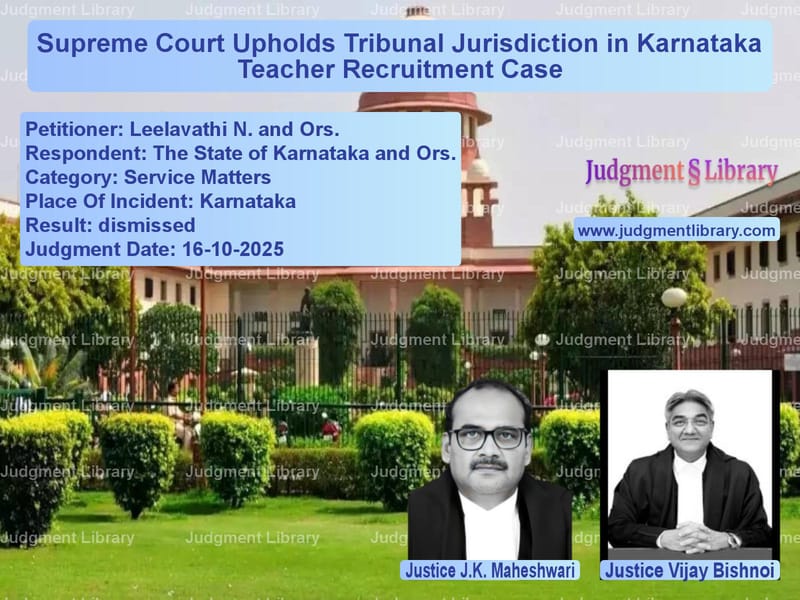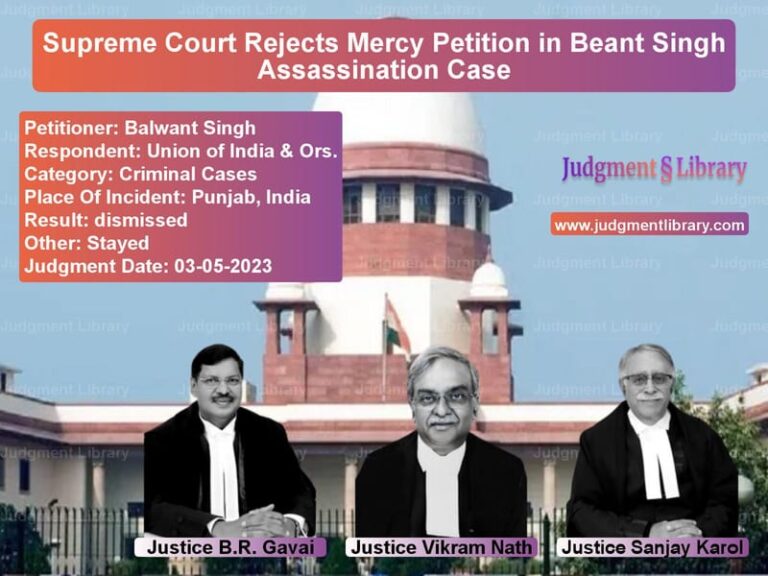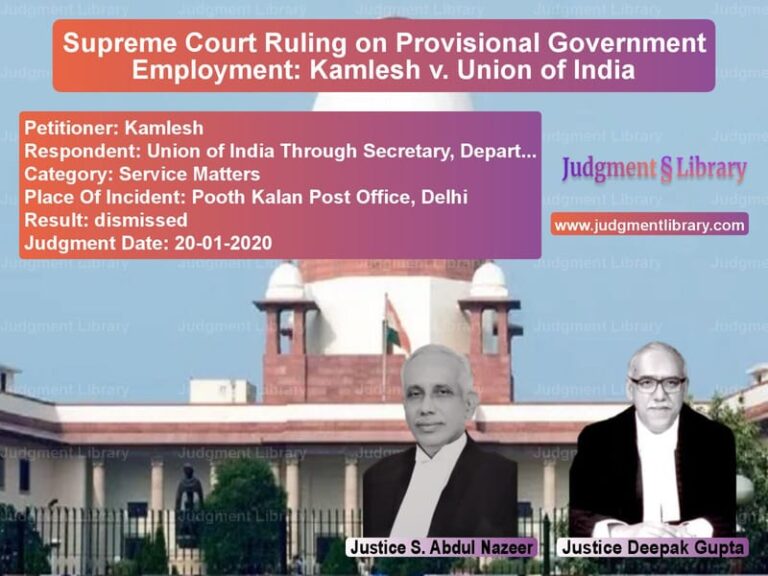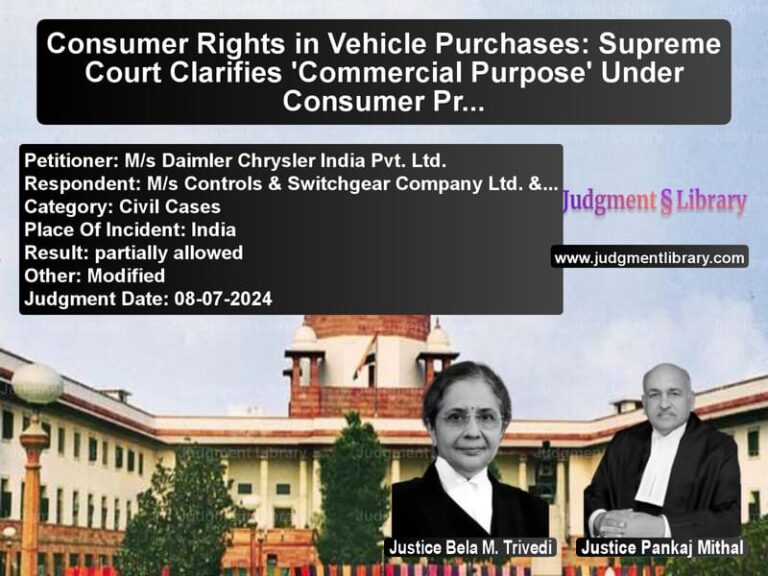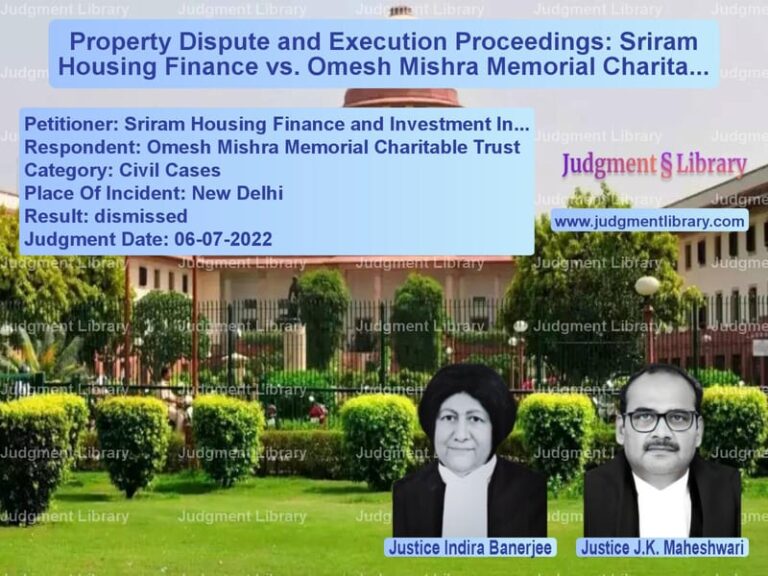Supreme Court Upholds Tribunal Jurisdiction in Karnataka Teacher Recruitment Case
In a significant ruling delivered on 16th October 2025, the Supreme Court of India addressed a complex legal battle concerning the recruitment of 15,000 Graduate Primary Teachers in the state of Karnataka. The case, which originated from disputes over the eligibility of married women candidates belonging to Other Backward Classes (OBC), revolved around a fundamental question: when can the High Court directly entertain a service matter dispute, bypassing the designated Administrative Tribunal? The judgment, set against the backdrop of Karnataka’s educational recruitment drive, reinforces the primacy of specialized tribunals as the first port of call for service-related grievances, underscoring a key principle of India’s judicial hierarchy.
The Genesis of the Dispute
The saga began in March 2022 when the Karnataka Department of Public Education issued a notification inviting applications for 15,000 teaching posts. Following written examinations, a provisional select list was published in November 2022. However, this list excluded several married women who had applied under the OBC category. The reason for their exclusion was that they had submitted caste and income certificates issued in their fathers’ names, whereas the selecting authority, the Deputy Director of Public Instruction (DDPI), insisted that married women must submit certificates based on their husbands’ caste and income to claim OBC reservation. Consequently, these candidates were considered under the general merit category instead.
The Legal Journey Through the High Court
Aggrieved by their exclusion, some of these candidates filed a writ petition before the Single Judge of the Karnataka High Court. The Single Judge framed three critical issues: the maintainability of the writ petition, whether a married woman’s caste and income should be determined by her parents or her husband, and whether the DDPI had the jurisdiction to interpret caste certificates issued by competent authorities.
Read also: https://judgmentlibrary.com/supreme-court-quashes-cbi-inquiry-in-up-legislative-recruitment-case/
In a judgment dated 30th January 2023, the Single Judge allowed the petition. On the maintainability issue, the judge relied on the Supreme Court’s decision in T.K. Rangarajan vs. Government of T.N., holding that when a large number of employees are affected, the High Court can entertain the petition despite the existence of an alternative remedy. On the substantive issue, the court held that “the creamy layer status of a candidate is determined on the basis of the status of his/her parents and not on the basis of his/her own status or income, or the status or income of his/her spouse on the ground that caste is determined by birth and it cannot be changed by marriage with a person belonging to another caste.” The court also ruled that the DDPI had no jurisdiction to interpret the certificates. Consequently, the provisional list was quashed, and the state was directed to prepare a fresh list, which was published on 27th February 2023. This new list included the previously excluded married women but ousted 451 candidates, including the appellants, who had originally been selected.
These ousted candidates then appealed to a Division Bench of the High Court. The Division Bench, in its impugned judgment dated 12th October 2023, took a different view. It set aside the Single Judge’s order, holding that the writ petitions were not maintainable. The Bench relied heavily on the landmark Constitution Bench ruling in L. Chandra Kumar vs. Union of India, which established that for service matters covered by the Administrative Tribunals Act, the Tribunal must be the court of first instance. The Division Bench framed the central question as: “Whether writ petition as filed seeking the relief thereunder is entertainable under Article 226 of the Constitution of India?” and answered it in the negative. It concluded that the situation was not an “unprecedented extraordinary situation having no parallel” as envisioned in T.K. Rangarajan, and thus, the matter should be adjudicated by the Karnataka State Administrative Tribunal (KSAT).
Arguments Before the Supreme Court
The matter then reached the Supreme Court, with two sets of appellants. The first set comprised candidates who were in the original provisional list of November 2022 but were excluded from the final list of March 2023. Their counsel argued that the direction issued by the Division Bench to continue with the appointments in terms of the final select list dated 08.03.2023 and not granting the consequential relief of proceeding as per the provisional select list dated 18.11.2022 after setting aside the Judgment and Order dated 30.01.2023, is unsustainable and without jurisdiction. They contended that since 13,352 candidates were appointed against 15,000 vacancies, they could be accommodated against the remaining posts.
The second set of appellants were those who benefited from the Single Judge’s order and were included in the March 2023 list. Their counsel submitted that the Division Bench erred in setting aside the well-reasoned Judgment of the Single Judge without properly appreciating the law laid down in T.K. Rangarajan (supra). They argued that the Division Bench was not justified in directing the state to defer their appointments.
The Respondent-State, represented by the Solicitor General, argued that the dispute primarily concerned the inter-se eligibility of candidates and that the state was a formal party ready to abide by the court’s orders. It was also submitted that 500 posts had been kept vacant to accommodate the outcome of the litigation.
The Supreme Court’s Analysis and Ruling
The Supreme Court, after a thorough analysis, dismissed all the appeals, upholding the Division Bench’s judgment. The court delved deep into the doctrine of alternative remedy and the jurisdictional hierarchy established by the Administrative Tribunals Act, 1985.
The bench extensively referred to the Constitution Bench judgment in L. Chandra Kumar, which is considered the cornerstone on this issue. The court quoted the pivotal principle from that case: “We may add that the Tribunals will, however, continue to act as the only courts of first instance in respect of the areas of law for which they have been constituted.” Elaborating further, the court reproduced another crucial excerpt: “By this, we mean that it will not be open for litigants to directly approach the High Courts even in cases where they question the vires of statutory legislations (except, as mentioned, where the legislation which creates the particular Tribunal is challenged) by overlooking the jurisdiction of the Tribunal concerned.”
The Supreme Court reasoned that the Single Judge had erred in relying on T.K. Rangarajan, which involved the extraordinary circumstance of the dismissal of two lakh employees. In contrast, the present case involved the rejection of certificates of 481 candidates during a recruitment process – a scenario that, while unfortunate for the candidates, is not so extraordinary as to bypass the statutory mechanism. The court noted that such discrepancies in recruitment are not uncommon and are precisely the kind of disputes the Tribunals are empowered to handle efficiently.
The judgment also highlighted that the KSAT is a fully equipped judicial body with the powers of a civil court, the authority to regulate its own procedure, pass interim orders, and even punish for contempt. With a statutory mandate to decide cases within six months, it provides an effective and efficacious alternative remedy. The court found that the facts of the case did not fall into any of the recognized exceptions to the rule of alternative remedy, such as the enforcement of a fundamental right, a violation of natural justice, or a challenge to the vires of a legislation.
Regarding the appellants from the first set who sought the revival of the November 2022 provisional list, the court held that “the appellants of the first set of the appeals (A) were figured in only the provisional select list issued on 18.11.2022 and, therefore, no right has been accrued to them.” Any direction to act on that list would create confusion.
The Final Outcome and Directions
In its concluding remarks, the Supreme Court dismissed the appeals and made the interim orders passed earlier absolute. It clarified that the 500 posts reserved by the state shall be filled as per the final judgment of the KSAT. Most importantly, the court directed the KSAT to make every endeavor to decide any application filed by the aggrieved candidates expeditiously, preferably within six months from the date of filing. The Supreme Court explicitly clarified that it had only adjudicated on the issue of maintainability and had not expressed any opinion on the merits of the case regarding the determination of the creamy layer for married women.
This judgment serves as a powerful reaffirmation of the structured dispute resolution mechanism in service matters. It underscores that the High Courts’ writ jurisdiction, though wide, must be exercised judiciously and not as a default first resort when a specialized, effective, and statutory alternative forum exists. The ruling ensures that the KSAT will now be the arena where the substantive rights of these aspiring teachers will be finally determined.
Petitioner Name: Leelavathi N. and Ors..Respondent Name: The State of Karnataka and Ors..Judgment By: Justice J.K. Maheshwari, Justice Vijay Bishnoi.Place Of Incident: Karnataka.Judgment Date: 16-10-2025.Result: dismissed.
Don’t miss out on the full details! Download the complete judgment in PDF format below and gain valuable insights instantly!
Download Judgment: leelavathi-n.-and-or-vs-the-state-of-karnata-supreme-court-of-india-judgment-dated-16-10-2025.pdf
Directly Download Judgment: Directly download this Judgment
See all petitions in Employment Disputes
See all petitions in Recruitment Policies
See all petitions in Public Sector Employees
See all petitions in Reservation Cases
See all petitions in Judgment by J.K. Maheshwari
See all petitions in Judgment by Vijay Bishnoi
See all petitions in dismissed
See all petitions in supreme court of India judgments October 2025
See all petitions in 2025 judgments
See all posts in Service Matters Category
See all allowed petitions in Service Matters Category
See all Dismissed petitions in Service Matters Category
See all partially allowed petitions in Service Matters Category

